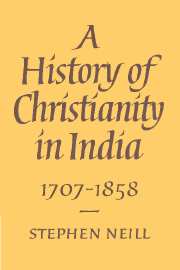Book contents
- Frontmatter
- Contents
- Preface
- Editorial Note
- Abbreviations
- 1 India and Political Change, 1706–86
- 2 The Tranquebar Mission
- 3 The Thomas Christians in Decline and Recovery
- 4 Roman Catholic Missions
- 5 Anglicans and Others
- 6 The Suppression of the Jesuits
- 7 The New Rulers and the Indian Peoples
- 8 Government, Indians and Missions
- 9 Bengal, 1794–1833
- 10 New Beginnings in the South
- 11 The Thomas Christians in Light and Shade
- 12 Anglican Development
- 13 The Recovery of the Roman Catholic Missions
- 14 Education and the Christian Mission
- 15 Protestant Expansion in India
- 16 Indian Society and the Christian Message
- 17 Towards an Indian Church
- 18 The Great Uprising
- APPENDICES
- Notes
- Select Bibliographies
- Index
8 - Government, Indians and Missions
Published online by Cambridge University Press: 07 September 2009
- Frontmatter
- Contents
- Preface
- Editorial Note
- Abbreviations
- 1 India and Political Change, 1706–86
- 2 The Tranquebar Mission
- 3 The Thomas Christians in Decline and Recovery
- 4 Roman Catholic Missions
- 5 Anglicans and Others
- 6 The Suppression of the Jesuits
- 7 The New Rulers and the Indian Peoples
- 8 Government, Indians and Missions
- 9 Bengal, 1794–1833
- 10 New Beginnings in the South
- 11 The Thomas Christians in Light and Shade
- 12 Anglican Development
- 13 The Recovery of the Roman Catholic Missions
- 14 Education and the Christian Mission
- 15 Protestant Expansion in India
- 16 Indian Society and the Christian Message
- 17 Towards an Indian Church
- 18 The Great Uprising
- APPENDICES
- Notes
- Select Bibliographies
- Index
Summary
THE EPOCH OF REFORM
The British authorities in India had guaranteed to the inhabitants of India full toleration of their established customs and practice in matters of religion as in other areas of life. But how far is the policy of toleration and non-interference to be carried? Should it include acceptance, and even protection, of customs and practices which are condemned as inhuman and intolerable by the general conscience of mankind, even though these should have obtained a religious or quasi-religious sanction? And where is this general conscience of mankind to be found?
The Western world, largely under the influence of Christianity, has accepted monogamy as the basis of society. Christian rulers over Muslim subjects have generally found it better not to attempt to alter the Muslim law of marriage, which in accordance with the precepts of the Quʾrān permits to faithful Muslims four regular marriages. Hindu groups have various and complicated rules regarding endogamous and exogamous marriage. There seemed to be no reason why these should not be allowed to continue in force. Child marriage was regarded by many as objectionable, but the objections had not been felt by the Christian ancestors of the British in India. It was clear, however, that Hinduism, at least in its later forms, had cast the mantle of sanctity over some customs which by wide sections of opinion in the West were regarded as inhuman.
- Type
- Chapter
- Information
- A History of Christianity in India1707–1858, pp. 156 - 185Publisher: Cambridge University PressPrint publication year: 1985



